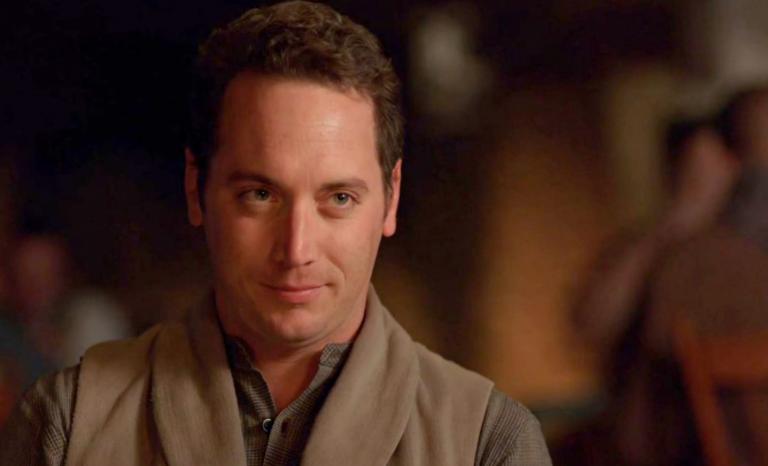
(Still photograph by James Jordan)
***
Marking a milestone in the history of the Interpreter Foundation, we published a blog entry today with an invited note from Dr. Matthew Bowen, of Brigham Young University — Hawaii:
“500 Weeks of Interpreter: A Journal of Latter-day Saint Faith and Scholarship”
***
I’ve still been going through past blog entries, culling out items that I think might be useful for current or future writing projects. Here’s one of them:
In August 1883, David Whitmer, the last surviving Witness of the Book of Mormon plates, spoke with a prominent member of the Church of Jesus Christ of Latter-day Saints by the name of James H. Hart (1825-1906), who was searching, at the time, for portraits of the Three Witnesses for the YMMIA’s publication, The Contributor. Hart, who was then the Church’s immigration agent in New York City, traveled to Missouri to secure and later to return a photograph of Oliver Cowdery that was in the possession of Cowdery’s daughter. (Cowdery had died at David Whitmer’s home on 3 March 1850.) While he was there, Hart took advantage of the opportunity to interview Whitmer. As a former journalist, Hart knew Pitman shorthand and took the interview down verbatim. From his Pitman notes Hart produced two articles (one of which was published in the Deseret News) and a narrative poem. On a subsequent visit, Hart read the poem to Whitmer, who, he said, approved it.
The paragraph immediately above is adapted from “Literary Joseph Fielding Smith #09: James H. Hart’s Interview with David Whitmer,” by Kent Larsen (kindly brought to my attention by Justin Hart; James Henry Hart was his great great grandfather). The entire poem may be found in the Larsen article. Here, I cite from the conclusion of that article:
While Hart’s poetry isn’t on par with the best of his day, even among Mormons, (it is better than most) still he has moments when his reworking of Whitmer’s words adds some power, if not beauty:
“If this be not truth, there is no truth,
And I have been mistaken from my youth.
If I’m mistaken, you may know from hence
That there’s no God, no law, no life, no sense.
“I know there is a God-I’ve heard his voice,
And in his power and truth do still rejoice;
Though fools may ridicule and laugh to-day,
They yet shall know the truth of what I say.
I particularly like these two stanzas, which seem to me like the heart of the poem:
“No tongue can tell the glory and the power
That was revealed to us in that blest hour.
The plates of brass and gold, with angel’s care,
Were placed before us as we waited there.
“We saw the fine engravings on them, too,
And heard the voice declare the book was true.
And what we saw and heard was by the grace
Of Him who died to save the human race.
And surely Hart’s description of the gentile doctor (apparently Oliver Cowdery’s son-in-law and Whitmer’s Nephew-in-law, Dr. Charles Johnson) should be better known:
I asked a Gentile doctor, and was told
That David Whitmer’s word was good as gold.
“His honesty is fairly crystallized-
His name will ever be immortalized.
“Although its all a mystery to me,
I know he’s honest as a man can be;
I’d stake upon his word my very life,
And so would this my good and noble wife.”
***
Here’s another item. It’s something that I hadn’t known about a well-worn anecdote — an especially popular story among atheists — that I’ve known for many years:
“Both Richard Dawkins and Christopher Hitchens quote an exchange between the emperor Napoleon and the brilliant French mathematician Pierre Simon de Laplace. Laplace had taken Newton’s work and extended it in a substantial way to the entire solar system, presenting his results in Celestial Mechanics, first published in 1799. Newtonian physics was thus shown to govern the complicated interactions among the planets. Some time later, Laplace made a present of his book to Napoleon. The emperor read it and then said to Laplace: ‘You have written an entire book about the world without mentioning its maker.’ Laplace’s response was: ‘Sire, I had no need of that hypothesis.’
“Unfortunately, both Dawkins and Hitchens leave out the final punch line of this story: Napoleon later repeated his exchange with Laplace to another great French mathematician, Joseph-Louis Lagrange, who had also done important work in astronomy and mathematics. Lagrange’s answer was ‘Ah! mais c’est une belle hypothèse; ça explique beaucoup de choses’ (‘Ah, but it is such a beautiful hypothesis; it explains many things’).”
Amir D. Aczel, Why Science Does Not Disprove God (New York: William Morrow/HarperCollins, 2014), 84-85.
And this, as well:
“The prolific eighteenth-century Swiss mathematician Leonhard Euler, one of the greatest mathematicians of all time, was also a deeply religious man. He was a member of the Royal Academy of Sciences in Saint Petersburg, Russia, and one day, the famous French atheist Denis Diderot came to visit the academy, apparently on a mission to convert its members to atheism.
“Euler was told about the visitor, and believed that Diderot knew nothing about mathematics. So he surprised him in a public debate by demanding, ‘Sir, a plus b to the nth power divided by n equals x; therefore, God exists! Respond!” Diderot, understanding nothing, could not open his mouth. Wild laughter erupted in the room; the humiliated Diderot withdrew and, the next day, packed his bags and returned to France.
“This story may well be apocryphal, but what the New Atheists are doing today is tantamount to the same thing. Without a shred of evidence on their side, they declare: ‘Science proves there is no God! Respond!” — and a public that may not be steeped in all the nuances and technicalities of science is left flummoxed, and hence vulnerable to the New Atheists’ overconfident pronouncements.”
Aczel, Why Science Does Not Disprove God, 242-243.











